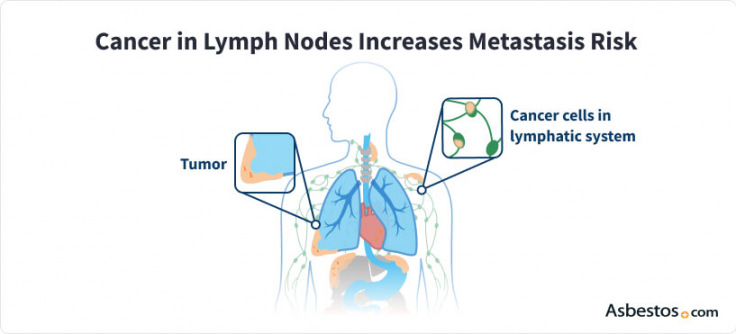
Get answers about treatment, top doctors, and financial support from the nation’s most trusted mesothelioma resource.
Get Your Free GuideStage 3 mesothelioma means the cancer has spread to nearby lymph nodes or organs. About 1 in 4 people are diagnosed at this stage. With treatment, many live 16 to 26 months, and some long-term survivors have lived more than 10 years.
Stage 3 mesothelioma is a cancer that has spread from where it started to nearby tissues, organs or lymph nodes. But it hasn’t spread to distant parts of the body. This is called a “locally advanced stage.”
Doctors use staging to learn how far mesothelioma has grown and spread. Mesothelioma staging shows the size and location of tumors, whether lymph nodes are involved and if the cancer has reached nearby tissues or organs. This information helps doctors choose the best treatment plan.
Dr. Jacques Fontaine, a thoracic surgeon at Moffitt Cancer Center in Tampa, shares more context with us. “In early stage or stage 1 mesothelioma, the patients have very little cancer, just in the lining around the lung. If the cancer has spread to some of the lymph nodes around the lung, that’s slightly more advanced, or stage 2 or 3 mesothelioma.” Fontaine said.
Stage 3 mesothelioma can cause symptoms like shortness of breath, fatigue or fever. These symptoms often get worse as the cancer spreads to nearby tissues and lymph nodes. Many people need more help managing symptoms at this stage.
Mesothelioma symptoms may appear 20 to 60 years after asbestos exposure. As tumors grow, they can make it harder to breathe and put pressure on the chest or other organs.
Stage 3 Mesothelioma Symptoms
Symptoms can be different for each person, depending on where mesothelioma spreads. With pleural mesothelioma, extra fluid can build up around the lungs called pleural effusions. This fluid makes it hard to breathe and causes chest pain. Tumors in the chest can also make symptoms worse.
If you have peritoneal mesothelioma, fluid can collect in your belly. This condition is called ascites or peritoneal effusions. The causes swelling and discomfort. You might also feel pain in your neck, back or shoulders, or have bloating, constipation or diarrhea.

Get answers about treatment, top doctors, and financial support from the nation’s most trusted mesothelioma resource.
Get Your Free GuideThe median life expectancy for stage 3 mesothelioma is about 16 months with treatment. This means half of patients live longer than 16 months. The average (mean) life expectancy is similar, ranging from 16 months to 19 months, depending on treatment and individual factors.
Your personal outlook, or mesothelioma prognosis, will depend on factors like cell type, your overall health and how far the cancer has spread. People who receive surgery, chemotherapy and radiation together may live longer.
Key Facts About Stage 3 Mesothelioma’s Outlook
Some people with stage 3 mesothelioma respond well to treatment and live well beyond their initial prognosis. New therapies and clinical trials can offer more options and help improve quality of life. For example, Russell Lamkins was first diagnosed with stage 3 pleural mesothelioma in 2014. He enrolled in a clinical trial in 2016 and shared with us how he was feeling as he surpassed the 5-year survival mark.
Russell told us, “When I was first diagnosed with stage 3 inoperable mesothelioma and told I had a year to live, I figured I’d better hurry up and finish projects I was working on. But now my goal is to make it to the 10-year mark.”

Russell Lamkins
Survivor Diagnosed in Stage 3 Has Success in Clinical Trial
When Russell Lamkins was first diagnosed with stage 3 mesothelioma, he was told it was inoperable and his life expectancy was about a year. He was then able to find success participating in a transarterial chemoperfusion study at the Moffitt Cancer Center in Tampa. Russell says, “My neighbors don’t even know I’m sick. I still look and feel pretty good.”
Russell Lamkins
Survival rates for stage 3 mesothelioma depend on mesothelioma type and the treatments received. With treatment, the 5-year survival rate for stage 3 peritoneal mesothelioma is about 29%, and it’s about 16% for stage 3 pleural mesothelioma.
The median survival for stage 3 pleural mesothelioma is about 16 months. For stage 3 peritoneal mesothelioma, it can be up to 26 months.
For testicular and pericardial mesothelioma, stage-specific survival rates aren’t available because there are so few cases. However, published reports show people with late-stage testicular mesothelioma tend to live about 24 months after diagnosis. Those with late-stage pericardial mesothelioma typically live around 10 months.
Some people with stage 3 mesothelioma live longer than these averages, especially if they respond well to treatments such as surgery, chemo or newer therapies. Individual prognosis depends on cancer type, cell type, overall health and response to treatment.
| 2-Year Survival Rate of All Stages | 5-Year Survival Rate at Stage 3 | Median Survival | |
|---|---|---|---|
| Pleural Mesothelioma | 22% | 16% | 16 months |
| Peritoneal Mesothelioma | 35% | 29% | 26 months |
Lymph nodes are small glands that help your body fight infections. When mesothelioma spreads to the lymph nodes, it makes it harder for the immune system to fight the disease, and treatments often don’t work as well.
Because treatments like surgery usually aren’t as helpful once mesothelioma is present in the lymph nodes, people with mesothelioma in many lymph nodes usually live about 13 months. Early treatment can slow the spread and may help people live longer.
Sometimes, stage 3 mesothelioma can progress to stage 3B. This is when tumors grow into the diaphragm or the tissue lining the heart called the pericardium. Surgery usually isn’t an option when mesothelioma reaches stage 3B.

Stage 3 mesothelioma treatment includes combinations of treatments, known as multimodal therapies. This can include immunotherapy, chemo, radiation and clinical trial options. The goal is to help people live longer and better, stopping or slowing the growth of mesothelioma tumors. If tumors haven’t spread too much, doctors may recommend surgery to remove them.
Most Common Treatments for Stage 3 Mesothelioma
Dr. Daniel A. Landau, an oncologist and hematologist at the Medical University of South Carolina, tells us, “When I diagnose a patient with stage 3 peritoneal mesothelioma, it typically means the cancer has spread across the abdominal lining and into nearby lymph nodes. I’ve seen how this stage can significantly limit treatment options, which is why early detection is crucial.”
Multimodal treatment may be given to some patients where personalized therapies target the cell type, cancer stage and the location of the tumor. Clinical trials offer access to new or experimental drugs.
Stage 3 mesothelioma varies depending on where the disease begins. Pleural, peritoneal, pericardial and testicular mesothelioma each show distinct signs and patterns at this stage. These differences affect how the disease spreads and which parts of the body are involved.
Because each type behaves differently in early and later stages, doctors use different staging systems or approaches. Pleural mesothelioma has a well-established staging system, while other types rely on different methods to track progression and guide treatment.
After a stage 3 mesothelioma diagnosis, connect with a doctor who specializes in this cancer. Starting the right treatment for you as quickly as possible can give you the best chance of feeling better. Patient Advocates can help match you to doctors with experience treating mesothelioma cases like yours.
Following a healthy mesothelioma diet can also help. Exercise can also help you improve your overall health. Joining a mesothelioma support group is also a great way to learn from the firsthand experiences of other survivors what’s worked for them. Support groups often provide resources for improving the quality of life and mental health.
Survivor Kevin Hession shares with us that joining The Mesothelioma Center’s support group has helped him. He also shared an insight that’s been important for him personally. He tells us, “I think it’s very important to have goals. My wife wanted to go to Rome. Well, last February we went to Rome.”

Connect with top-rated doctors specializing in mesothelioma treatment, who will personalize treatment options based on your diagnosis.
Find Your DoctorThere is no mesothelioma cure for any stage of the disease. A small number of stage 3 patients are eligible for surgery, which may significantly extend survival.
Symptoms of stage 3 mesothelioma may include shortness of breath, pain in the chest or abdomen, dry cough and fatigue.
There are a number of factors affecting mesothelioma life expectancy in stage 3.
Lifestyle changes, like diet and exercise, can help stage 3 mesothelioma patients. They may extend survival for those on chemotherapy, immunotherapy or other treatments.
Many cancer centers in the United States offer clinical trials for stage 3 mesothelioma patients. They test new drugs and innovative therapy combinations.
Stay up-to-date on treatment, research, clinical trials, doctors and survivors
The information on this website is proprietary and protected. It is not a substitute for professional medical advice, diagnosis or treatment. Any unauthorized or illegal use, copying or dissemination will be prosecuted. Please read our privacy policy and terms of service for more information about our website.
This website and its content may be deemed attorney advertising. Prior results do not predict a similar outcome.
The Mesothelioma Center’s claim as the most trusted resource is based on our more than 150 5-star Google and BBB reviews. Our organization also helps more than half of all mesothelioma patients annually diagnosed.
Your web browser is no longer supported by Microsoft. Update your browser for more security, speed and compatibility.
If you are looking for mesothelioma support, please contact our Patient Advocates at (855) 404-4592
The Mesothelioma Center at Asbestos.com has provided patients and their loved ones the most updated and reliable information on mesothelioma and asbestos exposure since 2006.
Our team of Patient Advocates includes a medical doctor, a registered nurse, health services administrators, veterans, VA-accredited Claims Agents, an oncology patient navigator and hospice care expert. Their combined expertise means we help any mesothelioma patient or loved one through every step of their cancer journey.
More than 30 contributors, including mesothelioma doctors, survivors, health care professionals and other experts, have peer-reviewed our website and written unique research-driven articles to ensure you get the highest-quality medical and health information.
My family has only the highest compliment for the assistance and support that we received from The Mesothelioma Center. This is a staff of compassionate and knowledgeable individuals who respect what your family is experiencing and who go the extra mile to make an unfortunate diagnosis less stressful. Information and assistance were provided by The Mesothelioma Center at no cost to our family.LashawnMesothelioma patient’s daughter


Landau, D. A. (2026, February 13). Stage 3 Mesothelioma. Asbestos.com. Retrieved February 13, 2026, from https://www.asbestos.com/mesothelioma/stage-3/
Landau, Daniel A. "Stage 3 Mesothelioma." Asbestos.com, 13 Feb 2026, https://www.asbestos.com/mesothelioma/stage-3/.
Landau, Daniel A. "Stage 3 Mesothelioma." Asbestos.com. Last modified February 13, 2026. https://www.asbestos.com/mesothelioma/stage-3/.

Dr. Jacques Fontaine is a thoracic surgeon at Moffitt Cancer Center in Tampa, Florida, where he heads up the Mesothelioma Research and Treatment Center. He specializes in minimally invasive robotic surgery and aggressive surgeries for mesothelioma.
Our fact-checking process begins with a thorough review of all sources to ensure they are high quality. Then we cross-check the facts with original medical or scientific reports published by those sources, or we validate the facts with reputable news organizations, medical and scientific experts and other health experts. Each page includes all sources for full transparency.
Please read our editorial guidelines to learn more about our content creation and review process.
